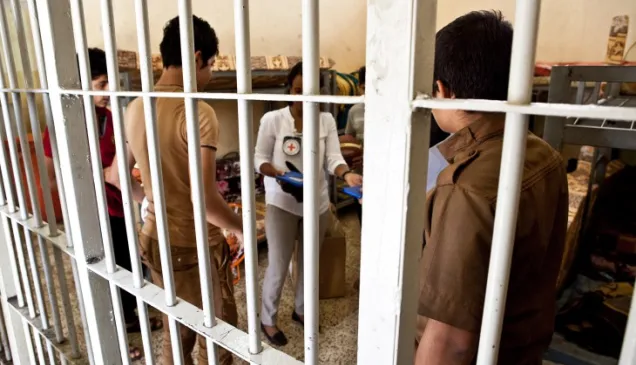Better protection for detainees

The UN General Assembly unanimously adopted a revised text of the Standard Minimum Rules for the Treatment of Prisoners (SMR) on 17 December 2015. The revised text reflects many of the major developments in detainees' rights and criminal justice since 1957.
The Standard Minimum Rules for the Treatment of Prisoners (SMR) were first adopted in 1957 by the UN General Assembly. They are known worldwide and are often regarded by States and prison authorities as the primary source of standards for the treatment of prisoners. They are reflected in many prison laws and regulations, and are a key framework used by inspection and monitoring mechanisms – and by the ICRC – in assessing the living conditions and treatment of detainees and in formulating recommendations to the authorities responsible for ensuring that these respect human dignity.
The revisions targeted key areas of ICRC concern, including:
- basic principles such as dignity and safety, impartiality and non-discrimination, the absolute prohibition of torture;
- the management of detainees' files, and notification of the facts surrounding a detainee's arrest and detention;
- the primacy of medical ethics in access to and provision of healthcare services in detention;
- restrictions, discipline and sanctions:
- application of fair trial principles to disciplinary proceedings;
- definition of solitary confinement and restriction on its use;
- strict regulation of and limitations on the use of instruments of restraint;
- searching procedures for detainees, cells and visitors;
- information to and complaints by detainees;
- contact with the family and the outside world;
- investigation of deaths in custody, disappearances, torture and other forms of ill treatment;
- independent inspections (the new SMR provisions for independent inspectors include access to all information on places of detention, numbers of prisoners, their location/treatment/conditions, free choice of the place of detention and interviewee and private and confidential interviews);
- staff training content, including negotiation and mediation skills.
While the SMR are a soft-law instrument, elements found in them reflect treaty law obligations. Other provisions reflect other international soft-law instruments, recommendations and observations of UN special procedures, professional ethical codes, etc.
The revised Rules will be known as the 'Nelson Mandela Rules' to 'honour the legacy of the late President of South Africa, in prison himself for 27 years and a committed advocate for the rights of prisoners.'
The ICRC was actively involved in the revision process. Although we were limited by our mandate, our involvement has resulted in a revised text that offers the possibility of significantly improved protection for detainees. The extent of that improvement now depends on political will towards their implementation and, most immediately, the dissemination of the Rules.
What are the next steps?
The States who unanimously adopted the text should make everyone involved in detention activities aware of its adoption, and of the key changes and additions, so that they can start using it.
The authorities responsible for detention should:
- devise plans for dissemination of the Rules (which includes translation and rendering into accessible language) and for the training/retraining of staff;
- start the process of updating important laws and regulations;
- consider using 18 July (formerly Nelson Mandela International Day) as an opportunity to raise awareness of detention issues, as was proposed when the Rules were adopted.
The same authorities should share the text with:
- detainees;
- families of detainees;
- legal representatives;
- internal and community health-care bodies;
- monitoring and inspection bodies;
- bodies responsible for preparing inmates for release and providing aftercare;
- staff training institutions;
- academic institutions;
- bar associations;
- legal aid and paralegal bodies;
- judiciary;
- police and prosecution services;
- any body that visits prisoners and/or seeks to assist them (consular representatives, religious organizations, NGOs), etc.



